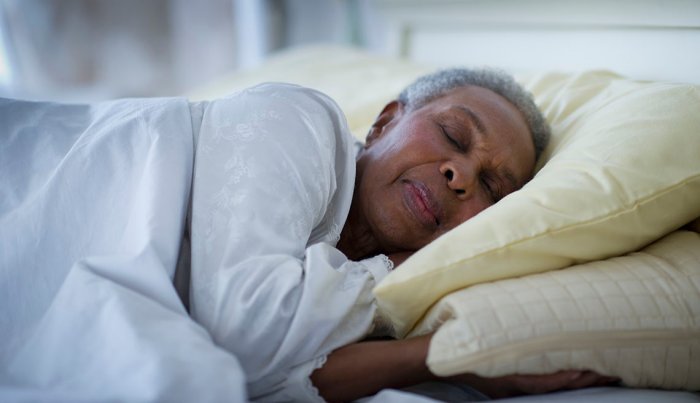Researchers pinpoint the optimal number of hours per night, and it’s not eight
by Donna Fuscaldo, AARP, May 11, 2022
Without enough sleep it can be hard to concentrate, and irritability can quickly sink in. But did you ever wonder how much sleep is ideal, especially as you age? Researchers at the University of Cambridge’s department of psychiatry and the Institute of Science and Technology for Brain-Inspired Intelligence at Fudan University in Shanghai did, and they discovered seven hours is the optimal amount of shut-eye if you are 40-plus.
Finding the sweet spot in terms of how long you should sleep is particularly important for older adults. Studies have demonstrated a link between sleep duration and the risk of developing Alzheimer’s and dementia.
“Getting a good night’s sleep is important at all stages of life, but particularly as we age,” says Barbara Sahakian, a Cambridge psychiatry professor and one of the study’s authors. “Finding ways to improve sleep for older people could be crucial to helping them maintain good mental health and well-being and avoiding cognitive decline, particularly for patients with psychiatric disorders and dementias.”

More or less than seven hours can harm cognitive performance
To determine how much sleep is ideal to achieve optimal brain function and mental health, researchers from the UK and China tapped the UK Biobank, poring over data from close to 500,000 adults ages 38 to 73. Participants in the UK Biobank were asked questions about their sleeping patterns, mental health and well-being. The study participants also underwent cognitive tests. Brain images and genetic data were available for about 40,000 of the adults.
After analyzing the data, the scientists found too little or too much sleep hurt cognitive performance including processing speed, visual attention, memory and problem solving. Seven hours of sleep, however, improved cognitive performance and mental health. People suffering from anxiety and depression reported worse well-being if they slept too little or too long. The results of the study were published in the journal Nature Aging.
It’s the why of it that researchers are now trying to unearth. One possible reason for cognitive decline with too little or too much sleep could be disruptions to deep sleep, a type of sleep that is closely linked to memory consolidation and the clearing of amyloid, a protein that when misfolded causes knots in the brain that are characteristic of some forms of dementia. The wrong sleep duration may also prevent the brain from unloading toxins, which could hurt cognitive performance. The researchers also said the findings indicate that insufficient or excessive sleep could be a risk factor for cognitive decline as we age. A panel of experts with AARP’s Global Council on Brain Health said in a 2016 report that sleep is vital to brain health. The panel recommended seven to eight hours of sleep each day.
How to get a better night’s sleep
If you are getting too little or too much sleep, here are strategies you can employ to improve your sleep patterns.
- Create a sleep schedule. It’s hard for your body to get into a sleep routine if you go to sleep and wake up at different times every day. Putting yourself to sleep on a schedule will get your body and brain accustomed to going to sleep and waking up at the same time.
- Don’t nap too much. Taking a nap during the day is enticing, but if you sleep too long it could disrupt your sleep patterns at bedtime. According to the Sleep Foundation, the best time to nap is right after lunch, in the early afternoon. Naps should last only around 20 minutes.
- Create a calming bedtime environment. Tossing and turning at night can be avoided if you create a calm environment before going to sleep. That means engaging in some quiet activity such as reading a book, listening to soft music or stretching 30 minutes prior to bedtime. Stay away from bright lights and disconnect from smartphones, laptops and tablets that will keep your brain awake.
- Limit your caffeine and alcohol intake near bedtime. Sound slumber will be hard to come by if you are hyped up on caffeine or have a cocktail right before bedtime. That’s why experts say to avoid caffeine late in the day and alcohol right before you hit the sheets.
Donna Fuscaldo is a contributing writer and editor at AARP focusing on personal finance and health. She has spent over two decades writing and covering news for several national outlets, including The Wall Street Journal, Forbes, Investopedia and HerMoney.

